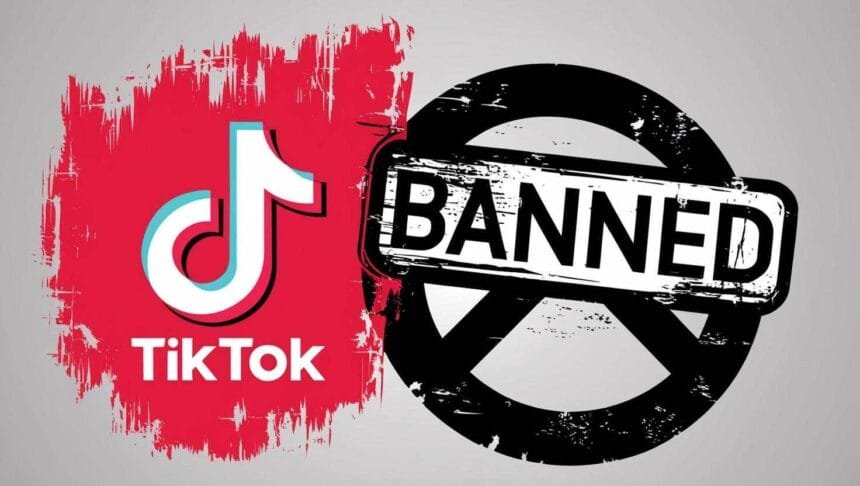The controversial TikTok ban in the United States has become a hot-button issue as the Supreme Court and President-elect Donald Trump grapple with the implications of the legislation.
With the “Protecting Americans from Foreign Adversary Controlled Applications Act” set to take effect on January 19, 2025, the decision carries significant political, legal, and technological ramifications.
What Does the TikTok Ban Entail?
The law, passed with bipartisan support and signed by President Joe Biden in April 2024, aims to curb TikTok’s operations in the U.S. unless ByteDance, its Chinese parent company, divests ownership.
Once enacted, the law will block U.S.-based companies like Apple and Google from hosting TikTok on their app stores.
It will also compel internet service providers to restrict access to the app via browsers.
This move reflects U.S. lawmakers’ concerns that TikTok poses a national security risk, as ByteDance could allegedly be coerced by the Chinese government to share user data or manipulate the app’s algorithm to influence public opinion.
However, critics argue that no substantial evidence has been presented to substantiate these claims.
For TikTok’s 170 million American users, the ban will not immediately erase the app from their devices.
However, without access to updates or patches, the app will degrade over time, making it less functional.
Moreover, new users will be unable to download TikTok unless they bypass restrictions using virtual private networks (VPNs), which could lead to a slower and less seamless experience due to the lack of U.S.-based servers.
Related: Supreme Court Weighs TikTok Ban Amid National Security Concerns
Supreme Court’s Role in TikTok’s Future
TikTok has appealed the legislation, arguing that it infringes upon First Amendment rights by restricting free speech.
The Supreme Court has agreed to hear the case, signaling the seriousness of TikTok’s challenge.
During oral arguments, the justices expressed skepticism regarding TikTok’s defense, which raises questions about whether the court will ultimately uphold or strike down the law.
Legal experts suggest that the Supreme Court may temporarily suspend the implementation of the ban while deliberations are underway, potentially delaying its effects.
If the court finds that the ban violates First Amendment rights, it may issue an injunction requiring the government to explore less restrictive alternatives.
Such a ruling could alter the course of the legislation, requiring lawmakers to tailor their approach to addressing national security concerns.
Trump’s Position on the TikTok Ban
President-elect Donald Trump, who initially supported a TikTok ban during his first term, has shifted his stance.
Trump’s opposition to the ban stems from his recognition of TikTok’s cultural and political influence.
On his social media platform, Truth Social, Trump highlighted his popularity on TikTok, citing billions of views and engagements on hashtags associated with his brand.
As the ban’s enforcement looms, Trump has vowed to “save TikTok.” His legal team has petitioned the Supreme Court to delay the law’s implementation until after his inauguration, arguing that it would allow him to address the issue diplomatically.
However, as a private citizen until January 20, Trump lacks the authority to directly influence the court’s decision or suspend the law unilaterally.
Once in office, Trump will have limited avenues to counteract the ban. The law grants the president the power to pause the ban for 90 days if TikTok demonstrates progress in separating from ByteDance.
However, without concrete evidence of divestment, such a move would be legally tenuous and could be overturned in court.
Trump could also attempt to negotiate a deal for ByteDance to sell TikTok to a U.S. company, though ByteDance has resisted such efforts thus far.
Implications of the TikTok Ban
The ramifications of the TikTok ban extend beyond the platform’s operational capabilities.
A shutdown would impact content creators who rely on TikTok for their livelihoods, disrupt businesses leveraging the platform for marketing, and potentially set a precedent for broader restrictions on social media platforms.
Critics have also raised concerns about the implications for internet freedom, as the ban represents a significant step toward government control over digital platforms.
Ironically, the ban could exacerbate the very risks it seeks to mitigate. If TikTok’s U.S. operations are shuttered, ByteDance could relocate its servers and user data to China, making it more susceptible to government access.
This would undermine the national security objectives that the law purports to address.
Alternatives to a Full Ban
Experts argue that targeted regulations could address lawmakers’ concerns without imposing an outright ban.
These measures might include stricter data localization requirements, third-party audits, or transparency mandates to ensure TikTok’s compliance with U.S. security standards.
Such approaches would preserve access to the platform while mitigating potential risks.



